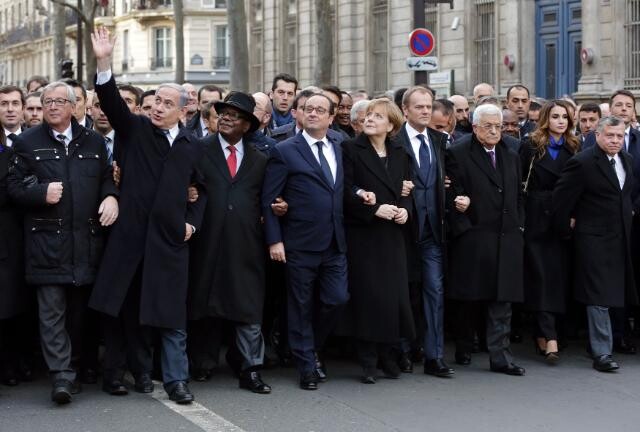Rights and Accountability 15 January 2015

Benjamin Netanyahu and Mahmoud Abbas join world leaders in Paris; both Israel and the Palestinian Authority routinely abuse the rights of journalists. (European Council President)
Palestinian journalists and social media activists are facing a crackdown on free expression at a time when Israeli Prime Minister Benjamin Netanyahu and Palestinian Authority President Mahmoud Abbas marched in Paris following fatal attacks in that city against the satirical publication Charlie Hebdo and a Jewish supermarket.
Journalists in the occupied West Bank continue to face the threats of persecution and violence from both Israeli and Palestinian Authority forces, accoding to a recent report by the Palestinian Center for Development and Media Freedoms (MADA).
According to the Ramallah-based group, Israeli occupation authorities arrested Palestinians “for their writings on Facebook” and the Palestinian Authority cracked down on “journalists, media students and activists for their writings on Facebook.”
In addition to a litany of other press violations, MADA noted that Israel arrested eight Palestinians from occupied East Jerusalem for their Facebook postings. The men, aged 18-45, were all indicted by an Israeli court in late December for “inciting anti-Jewish violence,” Agence France-Presse reported at the time.
As documented time and again at The Electronic Intifada, Israeli groups and high-ranking politicians regularly incite violence against Palestinians but rarely, if ever, face legal repercussions.
During Israel’s 51-day military assault on the besieged Gaza Strip this past summer, Moshe Feiglin, deputy speaker of the Israeli Knesset, was just one of several Israeli leaders to call for increased bloodshed. Writing on his Facebook page, Feiglin called for the “conquest of the entire Gaza Strip, and annihilation of all fighting forces and their supporters.”
“This is our country — our country exclusively,” he added, “including Gaza.”
“Stormed the house”
Noting a clear “escalation of violations” in December, the MADA report says that Israeli and Palestinian forces committed a combined total of thirty violations against Palestinian journalists throughout that month.
In the West Bank, Baha al-Jayoushi was one of several Palestinians arrested for criticizing the Palestinian Authority online. On 2 December, after being called into police headquarters several times for interrogation, al-Jayoushi was arrested for “vilifying” PA figures on Facebook, according to MADA.
The following day PA security forces arrested 23-year-old Islam Zaal, a media student at the Jerusalem-area Al-Quds University, for “inciting… against the Palestinian Authority on Facebook.”
PA security forces “stormed the house” of 22-year-old Amer Abu Hlayel, also a media student at Al-Quds University, on 5 December. After searching his home, “they handed an arrest order to his family for his writings on Facebook.”
A MADA spokesperson told The Electronic Intifada that Abu Hlayel was later “interrogated several times and then released.”
In addition to targeting students, the PA “committed violations against a number of freelance journalists,” the MADA report adds. Freelance journalist Amer Abu Aram, Wattan TV cameraman Mohammed Awad and Al-Quds TV producer Majdouline Hassoune were all interrogated in December for Facebook postings.
Aysar Barghouti, a correspondent for Wattan TV, was targeted for his reporting and arrested from his home in Kufr Ein, a Ramallah-area village. Freelance journalist Muath Amleh was also threatened and beaten for his writing.
On 14 December, “Quds Press agency correspondent Zaid Abu Arra received a summons from the director of the [PA’s] preventive security through his phone telling him that the apparatus are going to arrest him,” MADA continues, adding that just two days earlier “the preventive security forces summoned the media student at Al-Quds University, Qutaiba Hamdan, [and] detained, interrogated and beat him.”
Bullet “exploded in my leg”
While the Palestinian Authority has received increased criticism for its press crackdowns, Israeli forces — which regularly target, arrest and assault Palestinian journalists — continue to pose the greater threat to press freedom for Palestinians.
Israeli forces fired live ammunition at Palestinian cameraman Bashar Nazzal, 36, during a weekly demonstration in the central West Bank village of Kafr Qaddum on 5 December. “While we were standing at a distance of around 90-100 meters away from the Israeli forces, one of the snipers shot at me. I was far away from the protesters, visible from the army, and there were no other bullets or grenades shot in my direction,” the journalist told MADA.
“The bullet hit my leg and exploded inside, breaking bones,” he recalled. “I underwent surgery [on 6 December] in the Arab Specialist Hospital in Nablus. Four fragments were removed from my leg, but others are still inside.”
During Israel’s 51-day military assault on the besieged Gaza Strip last summer, fifteen Palestinian media workers and one foreign photojournalist, an Italian national, were killed. These journalists were killed and many others were injured while Israeli forces attacked Gaza from land, air and sea — and in some cases press workers appear to have been deliberately targeted.
A recent report issued by the watchdog group Reporters Without Borders deemed present-day Israel, the West Bank and Gaza the second deadliest place in the world for journalists in 2014.
Yet, as world leaders (including US President Barack Obama) condemned the fatal attacks on French journalists in Paris and claimed to support free speech and media freedom, condemnations of Israel’s attacks on Palestinian journalists remain few and far between.
Tags
- al-Quds TV
- Ramallah
- West Bank
- Gaza Strip
- Benjamin Netanyahu
- Mahmoud Abbas
- Palestinian Authority
- Reporters Without Borders
- Charlie Hebdo
- Paris
- France
- MADA
- Moshe Feiglin
- Baha al-Jayoushi
- Islam Zaal
- Amer Abu Hlayel
- Amer Abu Aram
- Wattan TV
- Al-Quds University
- Muath Amleh
- Qutaiba Hamdan
- Bashar Nazzal
- East Jerusalem
- Zaid Abu Arra
- Barack Obama
- Nablus
- Kafr Qaddum
- Quds Press
- Agence France-Presse






Comments
Do not forget the cartoonist
Permalink Ibrahim Lutf replied on
Do not forget the cartoonist Mohammad Sabaaneh.
Thanks
Permalink Jane a jew who rejects zionism Zacher replied on
I have started a wall in my apartment, dedicated to any and all victims, of this Regime. Thanks, now I have one more to add. The wall for me, is like the one in the Holocaust museum, which as we all know, the Zionists use to exploit, which cheapens the reason for such a place. This is my way of making sure the names of the Individual's who suffered at the hands of Evil, are never forgotten in the sands of time.
Jane Zacher